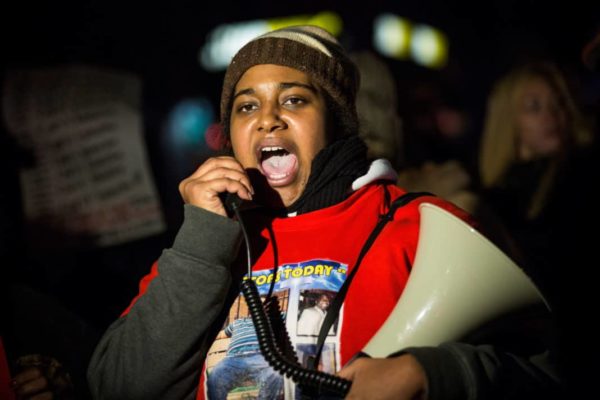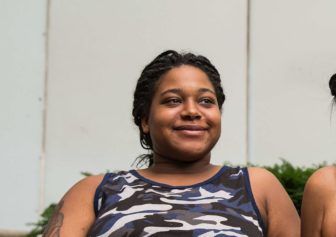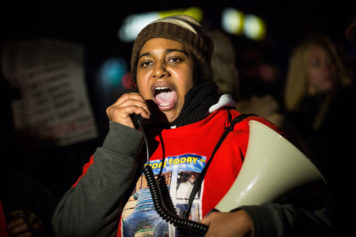
NEW YORK, NY – DECEMBER 11: Erica Garner, daughter of Eric Garner, leads a march of people protesting the Staten Island, New York grand jury’s decision not to indict a police officer involved in the chokehold death of Eric Garner in July, on December 11, 2014 in the Staten Island Neighborhood of New York City. Protests have continued throughout the country since the Grand Jury’s decision was announced last week. (Photo by Andrew Burton/Getty Images)
The final breath came not long after hers, when we heard the news. We’d been holding it, for the better part of a week, hoping, despite what we’d been told, her status would improve, her breathing would get stronger, her large eyes would open.
They did not. And on Saturday morning, we collectively took a deep breath and closed our eyes as headlines told us that 27-year old Erica Garner, the daughter of late husband, father and NYPD-chokehold victim, Eric Garner, had succumbed to the damage caused by a major heart attack just before Christmas. It was her second such attack since giving birth to her son in August, a pregnancy stressing her already enlarged heart.
But we already knew much more than the doctors were telling us. Because even though most of us did not have the pleasure of knowing her personally, there are things we still knew. We knew that Erica had an extra-large heart, one that caused her to stand up, speak out and wage largely unwinnable wars for her family, and for us, her community.
We knew that the thorny and thankless path of leadership she had chosen — rather, the path that had chosen her — was brutal and unforgiving, and paved with stress.
And we knew her untimely passing, regardless of official cause, was a tragic echo of a state-sanctioned sin committed three-and-a-half years ago on a Staten Island street corner by those who see us as less than human, while acting less than human; by those who treat us like monsters, while becoming monsters.
Although declared a homicide by the coroner — and although the city settled with the family for $5.9 million to avoid a suit — no one has been charged in the senseless July 2014 death of her father after he was arrested by several police officers on suspicion of selling single cigarettes and put in a chokehold by officer Daniel Pantaleo. In December of that year, a grand jury declined to indict Pantaleo who remains on the NYPD payroll.
Still, incredibly, after that reprehensible decision, although we should have been there for her, Erica was there for us. She threw herself into the deep, hollowed-out void left by the judicial travesty and became our voice, our emotions, our outrage, our fire. Despite a system that had ripped her heart from her, damaging it irreparably in the process, Erica campaigned for justice as if it still existed for the rest of us, if not for her loved one, then for ours, all of ours, the ones still living, the ones yet to be born, yet to be slain.
Erica spent the last three years of her life rallying for an end to police brutality, bolstering the Movement for Black Lives, staging weekly “die-ins” on the sidewalk at the site where her father was killed, and setting up a foundation in his honor. In 2016, she endorsed Vermont Sen. Bernie Sanders for president based on his vocal anti-brutality position, and she continued to demand increased transparency and accountability in policing at events, large and small, across the country.
And not long before she passed, Erica let us know that, whatever the cost, she was all in. “I’m not giving up, and this is the fight,” she told “Like it Or Not” in a final interview. “I’m in this fight forever.”
The second breath came at Christmas. Surely it was a mistake, and then it wasn’t. Not her, not after all she’s been through, all she’s overcome, all she’s been forced to shoulder. We gasped as the holiday headlines confirming that Erica was in a medically-induced coma, her brain deprived of oxygen from a heart attack, one triggered by an asthma attack and her inability to breathe.
Despite the paucity of details on her condition, we knew instinctively that a lack of breath had somehow contributed to her plight. After all, how could it not have, given her father’s viral execution, his breathtaking demise, his repetitious, now-iconic chant of “I can’t breathe” 11 times at the culpable hands of those who did everything in their power to ensure he could not.
The simple act of breathing, a biomechanical act most of us take for granted, was never simply a mechanical act for the Garner family. In a tragic foreshadowing, both father and daughter suffered from asthma, both regularly found it hard to breathe.
As her father’s primary legacy-bearer and namesake, Erica was forced to live his horrific death over and over again whether in her mind, in a courtroom, in a public forum, on social media, or in her ongoing quest for justice from a city that didn’t care, one less concerned with justice, law and order, than adjusting for the perceived loss of a racial order.
For activists like Erica, for those who assume the precarious mantle of community leadership, breathing doesn’t come easy. Between championing unheralded causes and waging battles on behalf of others, there is little room to breathe and less for self-care, for taking a break, especially when our needy world provides none. But if it were merely sport, rather than the unforgiving game of life, then there would be someone there, a trainer, a coach, to constantly remind us to take three deep breaths whenever we felt tired, stressed or overwhelmed, to re-energize us and get us back on track.
For Erica had warned us herself, several times, as recently as last month, that her chosen path — again, the path that had chosen her — was brutal and unrelenting. “I’m struggling right now from the stress of everything,” she said, “because the system, it beats you down.” She cited Venida Browder, the mother of Kalief Browder, a Bronx 22-year-old who, unable to readjust after years of wrongful incarceration as a teenager at New York’s infamous Riker’s Island, killed himself in 2015, saying Venida Browder died of a broken heart” because the late heart attack victim “kept on fighting for her son.”
So when the news of her own broken heart finally came, we looked back at the signs and recognized them for the first time, though they were there, hidden in plain sight all along. And after the scattered pieces came together, and it all sunk in, we took a deep breath and remembered who we are. We remembered the uniquely beautiful, extended and endangered family that we belong to. And we remembered that tragedy, for us, is ever a breath away.
The first breath was Erica’s. She took her first precious taste of air a mere 27 years ago in a New York hospital. She was the oldest of four children born to Eric and Esaw.
She was close to her father from the start. By all accounts, Erica was a “daddy’s girl” who helped out with her younger siblings given her mother’s work schedule and her father’s ongoing bouts with asthma.
Erica commonly heeded her father’s regular advice. “Everything that my dad told me, ‘You have to be a leader. You have to lead by example,’ now I understand why,” she said in a recent video.
She further honored her late father in August upon the birth of her son who she named “Eric.”
And it is this love for her father, for her children, for her loved ones, and for her community that her grieving family now wants everyone to remember most. A Saturday morning tweet from her official site read, “When you report this you remember she was human: mother, daughter, sister, aunt. Her heart was bigger than the world. It really really was. She cared when most people wouldn’t have. She was good. She only pursued right, no matter what. No one gave her justice.”
Perhaps now, after her final breath, she can hear us; perhaps, she always could, even in her wholly-compromised position, with damage to her oxygen-deprived brain, with tubes snaking about her motionless body. Maybe Erica could hear our every thought, our every prayer, our every meditation, our every wish, our every breath, directed at her, lifting her, letting her know, that even when it’s not, it’s okay.
Perhaps she knows we’re all here, gathered around her, all of us, the family’s all here, regardless of where we are, we are all here, surrounding her, holding hands, silently, breathing deep.
And as we take three deep breaths for Erica Garner, we do so not just for our beautiful fallen warrior, but for her two children, her late father, and for her family who has had their breath stolen from them two times too many.
We take three deep breaths for the activists among us, those who step up to bear the weight for us and our impossible struggle, and who too frequently forget to stop and breathe.
And we take three deep breaths for our own beloved community, one far too often forced to remember that tragedy, for us, is ever a breath away.


